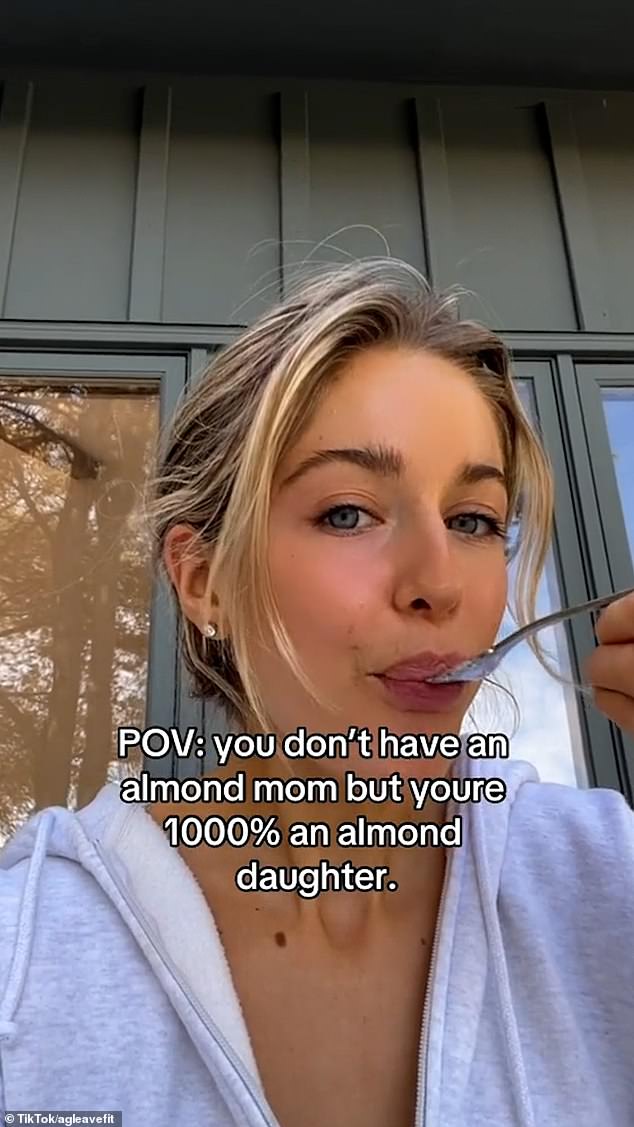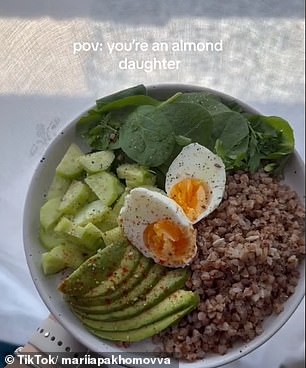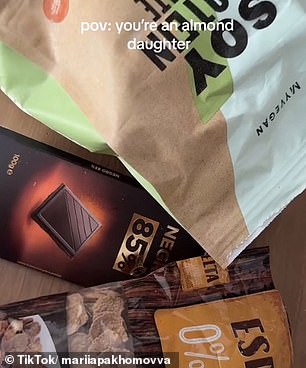TikTok’s ‘almond daughter’ trend leaves viewers divided as Gen Z women boast of their tiny meals and hardcore workouts – as some fear it’s fuelling eating disorders
You’ve probably heard of the “almond mother,” but Gen Z’s spinoff on the controversial TikTok trend is raising even more concerns.
The video platform is now filled with clips of young women and teens claiming to be “almond daughters” as they show off their tiny, super-healthy meals and gruelling workout regimes.
The original phrase “almond mother” was inspired by Yolanda Hadid, who told her supermodel daughter Gigi to “eat some almonds” when she said she was feeling weak.
The trend was first applied to mothers, with their children posting clips of the small portions they ate throughout the day, as their mothers indicated. The mothers themselves were also pictured eating small portions.
But now it seems that daughters are joining the trend, too. Some users worry that the app glorifies restrictive eating and exercise habits.
A TikToker posting under the username @taylorflesherr joined in on the trend by taking a video of herself taking a walk with the caption, “Unfortunately I’m an almond daughter and I have a meltdown if I can’t walk.”
A TikToker user shared a video in which she described herself as “THE almond daughter.” The new trend has sparked a debate about whether those who use the term “almond” are promoting restrictive eating or healthy eating
Another user, @agleavefit, photographed herself eating a meal, captioning it, “POV: You don’t have an almond mother but you are 1000% an almond daughter.”
A social media user who goes by the name @mariiapakhomovva recently posted a video sharing her “almond daughter’s” eating habits, sharing photos of meals she’d eaten, including a large bowl of salad, dark chocolate, and protein powder.
Commenters were divided over the video, with one concerned person writing: ‘Almond daughter? Almost, it’s actually clinically underweight and an eating disorder to maintain such a low BMI. Hope this helps.’
A second said: ‘An ‘almond’ thingy is code for an eating disorder. One almond mom has battled it so hard for years that her kids notice.’
One of them defended the almond daughters, writing: ‘That’s just healthy food, I hope it helps’, while a second agreed with her, writing: ‘But it’s normal, I love this kind of food’.
It seems that many people are less convinced of the impact of the ‘almond daughter’ trend. Some even describe it as ‘just healthy’ rather than just harmful.
Last year, millions of people shared their experiences with an ‘almond mother’, with the hashtag being viewed over a billion times.

A second TikTok user described having to take a daily walk to avoid having a “meltdown.” Last year, the term “almond mother” debuted online, describing the obsessive eating habits of mothers — now the tables have turned, and “almond daughters” are under fire

A third TikToker posted a video describing herself as “1000% an almond daughter” while eating from a fork. The viral phrase was inspired by Yolanda Hadid telling her daughter to eat almonds when she said she was feeling weak


A TikTok user shared several examples of his diet, including large bowls of salad and healthy snacks
The viral phrase was inspired by Yolanda Hadid, who advised her then-teenage daughter, supermodel Gigi Hadid — who was just 17 at the time — to “eat a couple of almonds and chew them really well” to satisfy her hunger in a resurfaced clip from Real Housewives of Beverly Hills.
In response to the criticism, Yolanda, who previously modeled herself, responded in an interview with People magazine by saying she was “half asleep” during the interaction with her daughter.
“I can’t even remember… There was no rhyme or reason to it. It’s such a silly story that’s out there, that has nothing to do with the reality of our lives,” she said.
To mock her critics, a clip surfaced of Yolanda eating a large bowl of almonds while doing various activities, including yoga, with the caption: ‘#worstmomever #almonds.’
This trend brought to light the restrictive eating habits of the ‘heroin chic’ era of the 1990s, when extremely thin figures were all the rage and disordered eating was common among women.
“Almond mothers” raise their children to be obsessed with food and their bodies in a way that is toxic and extremely damaging, an eating disorder specialist told Teenager Vogue last year.
Women who recognized Gigi on the Real Housewives Of Beverly Hills episode shared similar stories about eating tiny portions and avoiding fast food at all costs.
In one video, a Gen Zer who went out to dinner with her family compared her large portion of hamburger and fries to her mother, who swapped her sandwich for a roll and begged her kids to eat her fries for her.
In another clip, an American TikToker went viral after sharing a video of her “tonsil mom” walking through a hospital room to take her “steps” after an emergency visit.



Comments on one user’s video expressed concern about her “almond daughter’s” reported eating habits, which involved eating large salads and snacks

Others remained convinced that an almond daughter who shared photos of herself eating salads, protein powder and dark chocolate was ‘just being healthy’
Sadie Shaw, who goes by the username @sstraining, posted a photo of her fitness-obsessed mother pacing around the room like a maniac while she lay in a hospital bed.
“I’m literally in the emergency room and my almond mother is just walking around so she can still take her steps,” she wrote in the on-screen text accompanying the clip.
“She asked me if she could do push-ups in the corner since she missed her fitness class so I could meet her there,” she added in the caption.
Actress Gwyneth Paltrow is often seen as a celebrity example of an ‘almond mother’. She has been criticised for her diet, which includes drinking bone broth before an hour-long workout.
The ‘almond’ trend is a continuation of the Y2K fashion, which emphasized slimmer frames and endorsed all ways to get slim.
In fact, several videos under the heading “almond” feature a TikTok audio in which a male voice describes Kate Moss when she dominated the fashion world in the 1990s and 2000s.
The audio features a voice describing her as someone who ‘promotes anorexia’ and is linked to a number of ‘almond daughter’ videos, making it seem unlikely that many people are motivated by ‘just being healthy’.
For anyone struggling with the issues mentioned, the eating disorder charity Beat’s helpline is available 365 days a year on 0808 801 0677. You can visit their website here.
